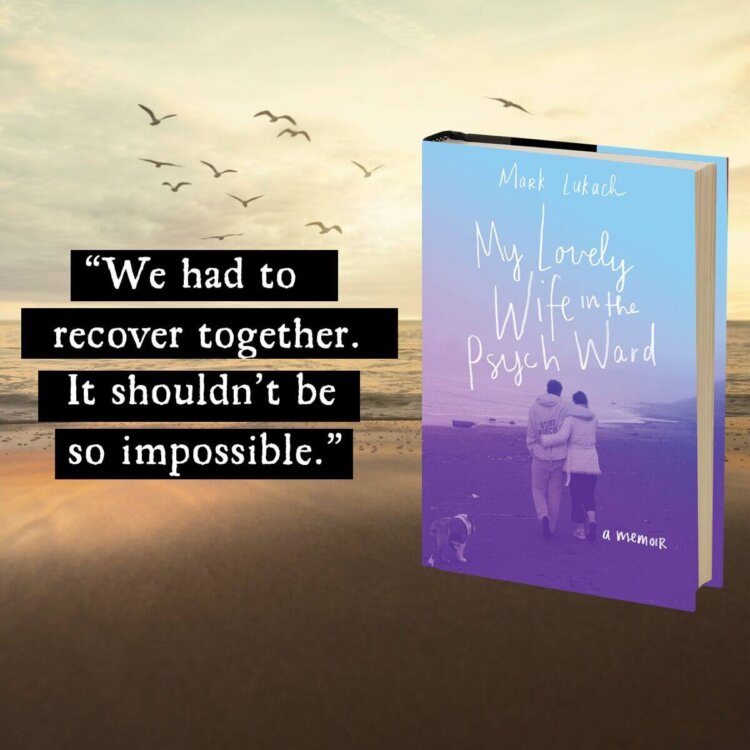
In this special interview, Mayim talks with author Mark Lukach, about his book, My Lovely Wife in the Psych Ward, which details his experience living with and loving his wife through the different stages of her mental illness.
Mayim Bialik: Thanks for talking to me, Mark. I was really, really taken with your memoir. It’s hard to pick what to talk about, because I feel like I could talk to you for hours about your experience. Tell us what it’s about.
Mark Lukach: This book tells of the unexpected arrival of mental illness in my wife’s life and how much that upended her, and, by extension, me. We met when we were eighteen years old, and forged our identities as adults together and had a pretty clear sense of what we thought the future held. It was a pretty dramatic curveball – she was hospitalized with psychosis. The book explores how two people who had a sense and an expectation of what life was going to look like respond individually and collectively, in a way that allows them to still be in love and take care of each other and thrive in the same way.
MB: We’ve all read stories about people living with someone with a mental illness, or about those who grew up in homes with or in families with mental illness, it’s kind of this pervasive thing that’s always there. You learn to work around it, or to be in denial about it or hide it when that’s helpful. For many of us it’s this sort of shame and underlying turmoil that frames lives. But ultimately, the story you tell is really one of expectations and then acceptance. We watch your expectations for the future shift as you both adjust to this new life. So, can you speak a little bit about communicating that shift in both your relationship and her mental state.
ML: Yes, I think cataloguing, discussing my wife’s health itself, is a little more straightforward, just because the onset of her psychosis was incredibly rapid and so pronounced. She went from what we would consider normal high-functioning adult to hospitalized with religious delusions within six weeks. That’s a really quick, quick time when there were no hints that this is something that she might have happen to her.
Her health is kind of broken up into three categories: the time in the hospital; the time out of the hospital, where she’s still sick, where she’s still moving out of her psychosis or processing the post-hospital suicidal depression; and then there’s the in-between normal stages where Giulia’s mental health isn’t something we really have to think about or talk about a ton, because we’re just kind of functioning, she’s on the right edge, grooving. Maybe if there’s some sort of stressful event, she might have a restless sleep night, so we’ll get a little bit more concerned, and talk to each other about what are we going to do the next night to make the sleep more successful, do you need to call somebody, etcetera; but that was pretty easily categorized.
As far as our relationship, that is so much more messier and more muddled. I have this view of humans that we are pretty good at handling normal situations, and I think that when thrown into what is so obviously a very intense crisis situations, primitive survival instincts kick in, we just kind of know, we just kind of act. But I think we really struggle between those two, those poles, where it’s not full Code Red nuclear crisis, but it’s also not your typical normal day. I wasn’t really expecting that the medium-sized challenges would actually be so difficult to navigate. The huge challenges are so monopolizing that you just forget about everything else and it’s, in some ways, fine. But when you instead you have this big health question in your relationship, and you actually have to be functioning mutual adults who help to take care of the household and provide income and stuff like that, that was one of those medium-sized things that we just had no idea what the hell to do. I was really drained by all of this supporting of her and honestly, I became pretty needy in return. A little bit of, “Hey! It’s time for my feelings to matter now!”
MB: And without giving away the ending of the book, how long ago was her first hospitalization?
ML: She was first hospitalized in 2009. And the diagnosis was that this was a “one-off” thing; there were truly no precursor symptoms and we thought it was likely major depression with psychotic features which I thought was essentially a trumped up definition of a nervous breakdown. So using all the right advice and support, we got pregnant just after she had recovered and we had a baby and loved it and everything was going great. The plan was that I was going be a stay-at-home dad, and Giulia was going to go back to work. She lasted back at work six weeks before she was back in the hospital with her second episode in 2012; our son was 5 months old. Her third hospitalization was in 2014 when our son was 2 1/2.
MB: So how is this for you as a dad?
ML: As a parent and a husband, I felt for the first time like I had to choose, “Whose care do I need to focus on more right now? This baby, or this hospitalized delusional wife?” I think an outsider, you would instinctively say, “Of course you have to take care of the baby…he’s totally dependent on you.” But emotionally I was still wired to be with this person- even though I loved our son so much- my muscle memory was wired for caring for Giulia, and I had to remind myself that I have to keep pouring everything into our son while still making space for Giulia there too.
MB: How did you come to this title for the book?
ML: I wrote an article for Pacific Standard a few years ago about this and I honestly think it was the online editor who proposed the title. Originally it was called “Crazy In Love” but online it’s called “My Lovely Wife In The Psych Ward.” I’ve really grown to love it. I think it sets up that it’s a book with the first half being about the Giulia that I fell in love with and our six years together. And then she was hospitalized and she’s no less lovely because of this; now we have just a full picture of who she is. And it doesn’t distract from my infatuation [with] and admiration for her.
MB: That’s so beautiful. Thank you so much. It such a fascinating book. I’m really excited to share it with our audience.
ML: I can not tell you how much that means for you to say that.
To learn more about Mark Lukach or to buy his memoir, click here.




 Read More From Mayim
Read More From Mayim
Grok Nation Comment Policy
We welcome thoughtful, grokky comments—keep your negativity and spam to yourself. Please read our Comment Policy before commenting.